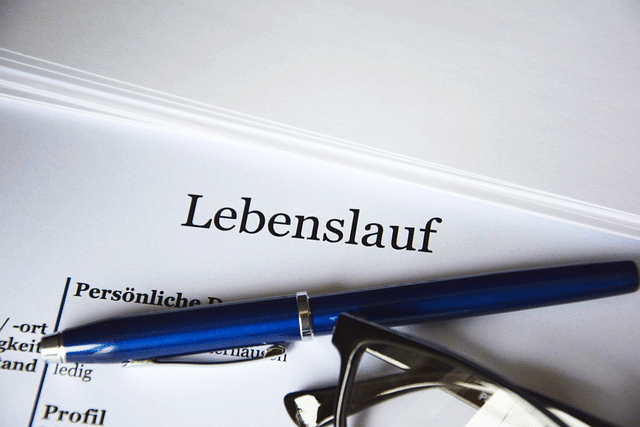
This Business German article will help you with important words, phrases and sentences which will be useful in your workplace as well as in formal situations.
Talking to strangers or executives, you will use the formal “Sie” form and not the “du” form. You can read more about these forms in our article 3 Types of German Pronouns with Free Quiz.
Sie (Ihr, Ihnen, Ihre)
You will also use the “Konjunktiv II” or the “K2” form more often in this case. You can read more about this form in the article The Subjunctive II (Konjunktiv II) in German on the website “German Very Easy“. To put it simply, this form is used to make requests or ask questions in a very polite manner. Keep reading for examples.
English: Please try the following.
German without K2: Probieren Sie Folgendes.
German with K2: Wäre es möglich, dass Sie Folgendes probieren?
Let us know in the comments if you want us to write an article on “K2”.
Business German Vocabulary
We have listed vocabulary in a generic way related to all professions below. Check out our vocabulary topic Berufe to learn more vocabulary about professions with flashcards and audio.
| English | German |
| Workplace | der Arbeitsplatz, die Arbeitsplätze |
| Office | das Büro, die Büros |
| Colleague | der Mitarbeiter, die Mitarbeiter |
| Boss | der Chef, die Chefs |
| Female Secretary | die Sekretärin, die Sekretärinnen |
| Assistant | der Gehilfe, die Gehilfen |
| employed | angestellt |
| unemployed | arbeitslos |
| Retired | die Rente, die Renten |
| freelance | freiberuflich |
| recruited | eingestellt |
| trained | ausgebildet |
| workaholic | arbeitswütig |
| employee-friendly | arbeitnehmerfreundlich |
| to hire | jdn. anstellen |
| to fire | jdn. entlassen |
| to quit | eine Stellung aufgeben |
| to freelance | freiberuflich arbeiten |
| to recruit | einstellen |
| to transfer | jdn. versetzen |
| to upskill | sich fortbilden |
| Allowance | die Spesen |
| Incentive | der Anreiz, die Anreize |
| Appraisal | die Abschätzung, die Abschätzungen |
| Salary / Stipend | der Gehalt, die Gehalte |
| Salary slip | der Gehaltsstreifen, die Gehaltsstreifen |
| Bonus | der Bonus, die Bonus |
| Tax | die Steuer, die Steuern |
| Bank account | das Bankkonto |
| Provident fund | die Altersversicherungskasse |
| Appointment letter | die Ernennungsurkunde |
| Resignation letter | das Kündigungsschreiben |
| Resume / CV | der Lebenslauf, die Lebensläufe |
| Qualification | die Ausbildung |
| Position | die Stellung, die Stellungen |
| Interview | das Vorstellungsgespräch |
| Phone call | der Anruf, die Anrufe |
| die E-mail, die E-mails | |
| Meeting | die Besprechung, die Besprechungen |
| Presentation | die Präsentation, die Präsentationen |
| Speech | der Vortrag, die Vorträge |
| Discussion | die Diskussion, die Diskussionen |
| Conversation | die Unterhaltung, die Unterhaltungen |

Business German for Telephone Conversations
Formal telephonic conversations in German will be slightly different than the regular informal conversations. As discussed above already, make use of the formal “Sie” form and “K2”.
| English | German |
| Good Morning. May I speak with Mrs. Mayer? | Guten Tag, könnte ich bitte mit Frau Mayer sprechen? |
| Good Morning. Could you please connect me with Mrs. Mayer? | Guten Tag, könnten Sie mich bitte mit Frau Mayer verbinden? |
| I will be happy to convey the message. | Ich werde es gern ausrichten. |
| What is your email address? | Wie ist Ihre E-Mail-Adresse? |
| Thank you for your patience. | Vielen Dank für Ihre Geduld. |
| Thank you for your understanding. | Vielen Dank für Ihr Verständnis. |
| Thank you for getting back to me. | Danke für die Rückmeldung. |
| We apologize for any inconvenience. | Wir entschuldigen uns für Unannehmlichkeiten. |
| How can I help you? | Wie kann ich Ihnen helfen? |
| What is your postal address? | Wie ist Ihre Anschrift? |
| Please may I introduce myself. | Darf ich mich vorstellen. |
| Thanks for your call. | Vielen Dank für Ihren Anruf. |
| Goodbye. | Auf Wiederhören. |
| Sorry, I have an important meeting. | Entschuldigen Sie, ich habe einen wichtigen Termin. |
| Who am I speaking to please? | Mit wem spreche ich bitte? |
Business German for Emails
In the opening lines of emails, instead of the more informal hello, a formal way is used to address the people. Keep reading to learn more. Also check out our guide to writing formal emails in German here.
| English | German |
| Dear Mrs. Mayer, | Sehr geehrte Frau Mayer, |
| Dear Mr. Mayer | Sehr geehrter Herr Mayer, |
| Dear Sir and/or Madam, | Sehr geehrte Damen und Herren, |
| Thank you in advance. | Vielen Dank im Voraus |
| Waiting for your feedback. | Ich warte auf Ihre Rückmeldung. |
| For further questions and clarifications, please do not hesitate to contact us. | Für weitere Fragen und Klärungen stehe ich Ihnen gerne zur Verfügung. |
| Thank you for your quick answer. | Vielen Dank für Ihre schnelle Antwort. |
| Sincere regards. | Mit freundlichen Grüßen. |
| Yours sincerely. | Mit freundlichem Gruß. |
| Looking forward to hearing from you soon. | Ich hoffe, bald von Ihnen zu hören. |
| I am sorry. | Es tut mir leid. |
| We look forward to your reply. | Wir freuen uns auf Ihre Antwort. |
| Thank you in advance. | Ich bedanke mich im Voraus! |
| Please bear with me. | Ich bitte um Verständnis. |
Business German During Meetings
| English | German |
| Excuse me. | Entschuldigen Sie. |
| Allow me? | Gestatten Sie? |
| Please note down. | Notieren Sie bitte. |
| Pay attention! | Passen Sie auf! |
| Thank you for your efforts. | Danke für Ihre Bemühungen! |
| We addressed several topics during the meeting. | Wir haben bei der Besprechung mehrere Themen behandelt. |
| He was responsible for taking the minutes of the meeting. | Während des Meetings war er für die Erstellung des Sitzungsprotokolls verantwortlich. |
| That is an important point for discussion. | Das ist ein wichtiger Diskussionspunkt. |
| We have set an appointment for the meeting. | Wir haben einen Termin für die Besprechung vereinbart. |

Business German During Presentations
| English | German |
| My dear colleagues, | Meine lieben Kolleginnen und Kollegen, …! |
| The topic of presentation is… | Das Thema des Vortrags lautet… |
| This is my opinion about… | Hier meine Meinung zu… |
| I woulk like to comment/make a remark about… | Gerne möchte ich eine Bemerkung zu … machen: … |
| I agree on this point but.. | Ich stimme dir/Ihnen zu, aber… |
| I don’t agree on this point because… | In diesem Punkt stimme ich dir/Ihnen nicht zu, weil… |
| I have segmented my presentation in four points. | Meine Präsentation besteht aus vier Teilen. |
| I would like to introduce you to.. in my presentation. | In meiner Präsentation werde ich Ihnen… vorstellen. |
| A further aspect is… | Ein weiterer Aspekt ist… |
| I will come shortly to the next point. | Ich komme gleich zum nächsten Punkt. |
| An example for that. | Dazu ein Beispiel. |
| This table shows… | Diese Tabelle zeigt… |
| This chart shows… | Diese Grafik zeigt… |
| To conclude, I would like to say… | Zusammenfassend möchte ich sagen… |
| With that I am at the end of my presentation. | Damit bin ich am Ende meiner Präsentation. |
| Do you have any questions? | Haben Sie noch Fragen? |
Business German During Speeches
| English | German |
| Thank you for your attention. | Vielen Dank für Ihre Aufmerksamkeit! |
| Thank you for having us. | Vielen Dank für Ihre Gastfreundschaft. |
| At the beginning I would like.. | Zu Beginn möchte ich… |
| I am talking about the topic … today. | Ich spreche heute zu dem Thema… |
| Thank you for inviting me today to talk in front of you. | Ich freue mich über die Einladung, vor Ihnen zu sprechen. |
| Today I am talking about… | Ich spreche heute zu dem / über das Thema… |
| First / Then / Next… | Zuerst / Dann / Danach… |
| Finally… | Abschließend… |
| I am ending the speech. | Ich komme jetzt zum Schluss. |
| To summarize, I would like to say… | Zusammenfassend möchte ich sagen… |
Business German During Discussions
| English | German |
| Our topic for today is… | Unser Thema heute ist… |
| Who would like to begin? | Wer möchte beginnen? |
| What is your opinion? | Was ist Ihre Meinung? |
| I would like to move to the next point. | Ich würde gerne zum nächsten Punkt kommen. |
| Could I say something about this? | Dürfte ich etwas dazu sagen? |
| The most important thing for me is… | Das Wichtigste ist für mich, dass …. |
| May I put something correctly? | Darf ich kurz etwas richtig stellen? |
| I previously said that… I actually wanted to say… | Ich habe vorhin gesagt, dass … Ich wollte eigentlich Folgendes sagen… |
| I am entirely agreeing to your opinion. | Ich bin da ganz Ihrer Meinung. |
| Please give me a few seconds! | Geben Sie mir bitte noch einige Sekunden! |
If you would like to learn more about Business German, let us know the topics in the comments section below or contact us here.
By
Last updated:
March 17, 2023
Germany is the powerhouse of the European economy, making German an important language in international business.
German-speaking businesses build cars, fly around the globe, develop medicines, make delicious food and drinks and transform our digital lives.
In other words, it’s time for you to get in on it and learn some business German vocabulary words—so let’s get started!
Contents
- What Is “Business German”?
- Useful Business German Vocabulary for the Workplace
-
- 1. Formal address: Sie (you), not du (you)
- 2. Applying for the job: Your Bewerbungsbogen (application forms)
- 3. Qualifications: Hochschule means “college,” not “high school”
- 4. Letter and email formalities: Mit freundlichen Grüßen (best regards) and more
- 5. Telephones: Hier spricht… (… speaking) and auf Wiederhören (Goodbye)
- 6. Directness: Kein Blatt vor den Mund nehmen (Don’t mince words)
- 7. Meetings: Attending or running ein Geschäftstreffen (a business meeting)
- 8. Networking: Make the most of “Vitamin B”
- How Can You Learn Business German?
- Sound Professional with Business German
Download:
This blog post is available as a convenient and portable PDF that you
can take anywhere.
Click here to get a copy. (Download)
What Is “Business German”?
Let’s get something straight: In order to become fluent in business German, you have to build fluency in regular German first.
No one in the office will take you seriously if you don’t get your cases right, use the correct adjective endings or pronounce things properly.
The problem is that “regular German” classes often focus on everyday encounters at first, with perhaps some literature thrown in at the higher levels.
It’s useful, and you’ll learn a lot from this approach, but when it comes time to write your German Lebenslauf (resume) or attend a German Vorstellungsgespräch (job interview), neither your ability to order a sandwich nor your knowledge of Goethe is going to get you the job.
This is where you need to go above and beyond what’s covered in traditional German classes. If you want to speak like a German businessperson, you’re going to need to learn business German.
Useful Business German Vocabulary for the Workplace
What are the kinds of information that distinguish business German from general German? Here are some examples:
1. Formal address: Sie (you), not du (you)
German has two forms of the pronoun “you”: the formal Sie and the informal du .
In business relationships, you always want to start with Sie for Kollegen (colleagues) and Kunden (customers/clients).
Often, colleagues and clients will specifically tell you if or when they feel comfortable allowing you to call them du. They’ll likely do this using the verb duzen (to use the du form).
Wir können uns duzen. (We can use the du form with each other.)
This might occur when you first meet, it might take some time or it might never happen at all. Everything depends on your type of organization and your relationship to the other person.
And remember that people will often introduce themselves by their last name only, like “Ich bin Müller,” or just Müller, to which it’s appropriate to say something like: “Es freut mich, Sie kennenzulernen.” (It’s a pleasure to meet you.)
2. Applying for the job: Your Bewerbungsbogen (application forms)
Once you’ve got all your Bewerbungsbogen together, applying for a job with a German company is as easy as sending off a direct translation of your English info, right? Wrong.
First of all, your resume contains all kinds of cultural information that might not translate. If you’re from the United States, you probably went to a high school, not a German Gymnasium .
But are the two terms close enough for you to use in translation? Not quite—the two institutions are part of two very different education systems.
You should “translate” your grades, though, if you include them on your documents. A 4.0 GPA sounds great to an American, but to a German, a 4 equated to a D average.
Second, a German resume often contains information seen as irrelevant or taboo in the States. In Germany, it’s common to attach a photo and mention your Familienstand (family status: married or single), age and citizenship status, as well as hobbies.
Finally, the resume is never enough on its own. Your Bewerbung (application) will need a strong Anschreiben (cover letter).
These are in addition to whatever Zeugnisse (certificates) your employer demands, which often involves not only letters from previous employers, but also academic transcripts ranging back to high school.
As an extra note here, it’s worth preparing and practicing a Selbstdarstellung (personal introduction). This is essential for a Vorstellungsgespräch (job interview), but also a worthwhile exercise ahead of business encounters with new colleagues and clients generally.
3. Qualifications: Hochschule means “college,” not “high school”
We’ve already commented on the dangers of trying to translate your qualifications. Here are a few more pitfalls.
In Germany, a Hochschule is the equivalent of an American college.
It differs from a Universität (university) in that Unis are usually more research-oriented, while Hochschulen focus on real-world applications and skills. However, both institutions offer bachelor degrees, with some Hochschulen offering master’s degree coursework as well.
An even further distinction is made for Gewerbe (the trades), such as construction, cooking and so on. These often involve Ausbildung (an apprenticeship) that replaces both college and the 11th and 12th (or even 13th) grade levels.
Meanwhile, U.S. associate’s degrees don’t translate at all, and are generally viewed as equivalent to the top German high school diploma, the Abitur .
Confused yet? Your employers might be too. This is why you should not try to translate the names of your degree and alma mater. Be prepared to describe your qualifications and competencies during an interview instead.
4. Letter and email formalities: Mit freundlichen Grüßen (best regards) and more
You will likely need to provide your email to potential employers or clients, and it’s highly possible you’ll need to collect others’ email addresses as well.
Knowing how to say common email-related terms will be extraordinarily beneficial. For instance:
- ( _ ) Unterstrich (underscore)
- ( – ) Minus /Bindestrich (hyphen)
- ( . ) Punkt (dot)
- ( @ ) At-Zeichen (at sign), but will almost always be referred to simply as At
So, an example email address might be: herr_kraus@blau-welt.de, as Herr-Unterstrich-Kraus-at-blau-Minus-Welt-Punkt-d-e.
Of course, if you have trouble catching someone’s email, you can ask: Könnten Sie das bitte buchstabieren? (Could you spell that please?)
Now, you’ve probably learned guten Tag and auf Wiedersehen as “hello” and “goodbye” respectively. In a business environment, though, that’s not how you’ll start or end emails.
Typically, the opening line of a formal letter or email is either Sehr geehrte Frau Klein (Dear Mrs. Klein) or Sehr geehrter Herr Meyer (Dear Mr. Meyer), literally translating to “most respected Mrs./Mr. [name].”
Pay close attention to the masculine or feminine adjective ending, and end the line with a comma. The next line, which begins the body of the message, is not capitalized unless it’s a proper name, a noun or the pronoun Sie.
The most common formal ending for emails and letters is Mit freundlichen Grüßen (with friendly greetings), followed by no comma and then your signature on the next line.
There are numerous variations on these greetings, some equally formal, some less so. Feel free to match the tone of whomever wrote to you first. If they start their email with Hallo Frank and end it with simply Grüße , you can certainly write Hallo right back.
5. Telephones: Hier spricht… (… speaking) and auf Wiederhören (Goodbye)
Similar to the above, formal business calls require language of their own.
It’s traditional to begin a phone call by identifying yourself and your company, often with hier spricht Karl (Karl speaking), in which you’d replace “Karl” with your own name.
Further useful and common telephone phrases include:
- Hier ist Frau Scholz. Mit wem spreche ich? (It’s Ms. Scholz here. Who am I speaking to?)
- Darf ich Herrn Schmidt sprechen? (Can I speak to Mr. Schmidt?)
- Ich rufe an, um ein Treffen zu vereinbaren. (I’m calling to arrange a meeting.)
- Können Sie das bitte wiederholen? (Can you repeat that please?)
- Wie bitte? Ich habe nicht verstanden. (What was that? I didn’t understand.)
If you’re calling to follow up on an application you sent, you might want to know: Ich rufe wegen einer Initiativbewerbung an, die ich vor zwei Wochen geschickt habe. (I’m calling about an unsolicited application that I sent two weeks ago.)
You should also note that it’s inappropriate to say auf Wiedersehen on the phone, because it literally means “until we see each other again,” but you don’t see people on the phone. The formal farewell on a business call is auf Wiederhören (until we hear each other again).
6. Directness: Kein Blatt vor den Mund nehmen (Don’t mince words)
Germans are very direct in how they speak, especially when expressing requests and criticism. It can sometimes seem rude to Anglophone ears, but then our many “pleases,” subjunctive forms and euphemisms sound wishy-washy and superficial to Germans.
What do I mean? Instead of saying “I’m afraid the printer must have run out of paper,” a German is more likely to say “I need some paper.” Instead of saying, “Your presentation might be improved if you did X,” a German is more likely to say, “X is better. Do X next time.”
When your boss criticizes you in this manner, she’s probably not displaying aggression or disapproval. She’s just getting right to the point with a constructive suggestion for improvement.
There’s a general saying for this: Kein Blatt vor den Mund nehmen , which literally means “not to put a leaf in front of your mouth.” Figuratively, it means that someone doesn’t hide their words or intentions.
And Germans will expect this directness from you in German, so you’ll have to get used to it.
7. Meetings: Attending or running ein Geschäftstreffen (a business meeting)
A good starting point for tackling a meeting is to take responsibility for preparing the Tagesordnung in advance. Use an example for reference, whether from your office or online.
Doing so will mean you’ll arrive much better prepared to follow the Geschäftstreffen (business meeting), or—if you’re in charge—direct the flow of it. Here’s some useful vocabulary for this:
- Datum (Date)
- Uhrzeit (Time)
- Ort (Place)
- Teilnehmer (Attendees)
- Zweck (Purpose)
- Begrüßung (Welcome)
- Thema (Theme/Subject)
- Aktion (Action)
If you want to kick things up to the next challenge level when attending a German business meeting, try writing the Protokoll (meeting minutes). And again, if you’re running the show, make sure you’ve designated the meeting minutes writer, if you need one.
8. Networking: Make the most of “Vitamin B”
You may hear Germans call networking Vitamin B , which refers to the first letter of Beziehungen (relationships).
In a positive sense, Vitamin B means you have good connections, or you’re able to use your connections in beneficial ways.
It can, however, be used with a more negative connotation to imply that someone only received something because of their connections—much like “nepotism” or “favoritism” in English.
But if you’re working or planning to work in a German-speaking country, it’s essential to get out and meet people—particularly at events likely to be attended by professionals in your field.
Brush up on your small talk to start building up your own Vitamin B at such events, or even within your company or with clients:
- Wie geht’s Ihnen? (How are you?)
- Was haben Sie am Wochenende gemacht? (What did you do at the weekend?)
- Wie läuft es mit dem Projekt? (How is the project going?)
- Möchten Sie einen Kaffee? (Would you like a cup of coffee?)
- Bitte nehmen Sie Platz. (Please, take a seat.)
- Also Sie arbeiten in der Tourismusbranche. Wie sieht es derzeit in diesem Bereich aus? (So you work in the tourism business. What’s it like in this field at the moment?)
How Can You Learn Business German?
If you’re lucky, you might have access to business German classes at your local college, language school or Goethe Institute.
Alternatively, you can travel to a German-speaking region, take some business German classes and immerse yourself in the language and culture before trying to apply for jobs.
However, these opportunities are not realistic for most people. Don’t despair. It is possible to learn business German on your own.
Dialog Beruf (Dialogue Career) is a well-known series of textbooks that is often used in business German classes. If you’re dedicated, you can use these for self-studying.
Sometimes the books cover industries that may seem obscure or irrelevant to you. If it doesn’t seem important to your goals or your line of work, skip it! Focus instead on the more relevant vocabulary, grammar and cultural context that these books provide.
If you want to set concrete goals for yourself, you can aim to take the official WiDaF (Deutsch als Fremdsprache in der Wirtschaft — Business German as a Foreign Language) exam.
Many employers and schools will look for documented proof of C1 fluency or higher, and this exam is a great way to show that you’re not just fluent, you’re business fluent.
It’s also important to immerse yourself in the language and culture in order to get all the nuances down pat. A great way to do this is to incorporate native materials into your everyday life so that you’re constantly interacting with the language.
For instance, FluentU provides a library of authentic video material for learners of all levels. FluentU also provides interactive features, such as subtitles and transcripts that allow you to hover over any word, business-related or otherwise, to see its pronunciation, translation and in-context usage.
You can also look for business-related YouTube videos, movies and TV shows to spot more business vocabulary in use.
Sound Professional with Business German
Learning business German is just like learning general German, but with added cultural context and applications. In this regard, it’s somewhat advanced.
You can’t simply receive a list of twenty words or phrases and rote memorize them. You have to know what’s appropriate and when, so that you can sound professional.
But just in this one post, we’ve introduced you to more than twenty different German words and phrases, and that’s a huge start!
Review business German vocabulary at your own pace—maybe you can write an imaginary Bewerbungsschreiben with formal greetings and a discussion of your qualifications.
You’ll definitely need to do this one day if you hope to work in a German office, so you might as well start practicing now!
Download:
This blog post is available as a convenient and portable PDF that you
can take anywhere.
Click here to get a copy. (Download)
Conversing in German is one thing, but conducting business in German if you’re not a native speaker can be a bit challenging. Here are some examples of terms you may encounter when doing business in a German-speaking country, listed alphabetically.
Business-related German Vocabulary
Accountant der Buchhalter/die Buchhalterin
Certified public accountant (CPA) m. der Wirtschaftsprüfer
Certified public accountant (CPA) f. die Wirtschaftsprüferin
Tax accountant (certified tax advisor) m. der Steuerberater
Tax accountant (certified tax advisor) f. die Steuerberaterin
Audit n. die Bilanzprüfung (-en), die Rechnungsprüfung (-en)
Field audit (tax) die Außenprüfung
Tax audit die Steuerprüfung
Audit division/office der Rechnungshof
Audit v. die Bilanz prüfen
Auditor der Bilanzprüfer (-), die Bilanzprüferin (-nen), der Rechnungsprüfer, der Steuerprüfer (tax)
Auto-reply, out-of-office auto-reply n. die Abwesenheitsnotiz, die Eingangsbestätigung
Balance (sheet) fin. die Bilanz (-en)
Balanced adj.bilanziert
Bank n. die Bank (-en)
Board n. der Vorstand, der Ausschuss, das Gremium
Board of directors der Vorstand
To be on the board im Vorstand sitzen/sein
Board of governors der Verwaltungsrat/der Aufsichtsrat
Board of trustees der Beirat
Board meeting die Vorstandssitzung (-en)
Boardroom der Sitzungssaal (-säle)
Business das Geschäft (-e), die Wirtschaft, die Branche, der Betrieb (-e), das Unternehmen
Cash n. das Bargeld
Cash advance der Vorschuss
Cash dispenser/machine der Geldautomat
Cash or charge? Zahlen Sie bar oder mit Karte?
Cash point Br. die Kasse
To pay cash bar bezahlen
Certified public accountant (CPA) m. der Wirtschaftsprüfer (-)
Certified public accountant (CPA) f. die Wirtschaftsprüferin (-nen)
Certified tax advisor m. der Steuerberater (-)
Certified tax advisor f. die Steuerberaterin (-nen)
Client law der Mandant (-en), die Mandantin (-nen)
Client der Klient (-en), die Klientin (-nen)
Client, customer der Kunde (-n), die Kundin (-nen)
Credit, loan der Kredit
Tetter of credit der Kreditbrief (-e)
On credit auf Kredit
Credit balance der Kontostand
Debt die Schuld (-en), die Verschuldung (-en)
Debt collection agency das Inkassobüro
Debt rescheduling die Umschuldung
National debt Staatsschulden pl.
To be in debt verschuldet sein
Enterprise das Unternehmen (-)
A family enterprise/business ein Familienunternehmen
Euro der Euro (-)
It costs ten euros es kostet zehn Euro
Exchange (stock) die Börse (-n)
Exchange traded option börsengehandelte Option
Firm, company die Firma (Firmen)
Fiscal year das Rechnungsjahr
Global economy die Weltwirtschaft
Globalization n. die Globalisierung
Globalize v. globalisieren
Global trade der Welthandel
Gross n. das Gros (no pl.)
Interest die Zinsen pl.
Interest bearing mit Zinsertrag
Interest rate der Zinssatz (-sätze)
To bear/pay 5% interest 5% Zinsen ertragen
Investment die Kapitalanlage (-n), die Investition
Investment guidelines die Anlagerichtlinien (pl.)
Investor der Anleger (-), die Anlegerin (-innen)
Invoice die Rechnung (-en)
Invoice amount der Rechnungsbetrag
Job der Job (-s), die Arbeit (-en), die Stelle (-n)
Market der Markt (Märkte)
New Market Neuer Markt (Germany’s NASDAQ)
Portfolio fin. das Portfolio (-s)
Premium fin. die Prämie
Price der Preis (-e)
Purchase v. kaufen
Purchase n. der Kauf (Käufe)
Purchase order die Auftragsbestätigung (-en)
Purchaser, buyer der Käufer (-), die Käuferin (-innen)
Speculation die Spekulation (-en)
Speculator fin. der Spekulant (-en)
Stock exchange/market die Börse (-n)
Subsidiary die Tochtergesellschaft (-en)
Tax die Steuer (-n)
(Caution! Das Steuer means steering wheel, tiller or helm.)
Taxable steuerbar
Trade, trading n. der Handel, die Geschäfte pl
Transaction n. die Transaktion
Value der Wert (-e)
Venture capital n. das Beteiligungskapital, das Risikokapital
Volatility die Volatilität
How to Write a German Business Letter
The following sample business letter could be used for correspondence in Austria, Germany or Switzerland, if the writer wanted to make an inquiry at the local tourist office in Kirchdorf.
Betreff: Hotels und Pensionen in Kirchdorf 4
Sehr geehrte Damen und Herren,
würden Sie mir freundlicherweise 5 eine Liste der Hotels und Pensionen (der mittleren Kategorie) am Ort zusenden?
Daneben 6 bin ich an Informationen über Busfahrten zu den Sehenswürdigkeiten 7 der Umgebung im Juli interessiert.
Vielen Dank im Voraus!8
Mit freundlichen Grüßen
[signature]
Johann Mustermann
Translation:
Subject: Hotels in Kirchdorf 4
Dear Sir or Madam,
Would you kindly send me a list of the five hotels (middle category) in your location?
In addition, I am interested in information on bus trips to local attractions in July.
Thanks in advance!
Best regards
[Signature]
Johann Mustermann
German Business Expressions and Phrases
Here are some phrases you may want to learn that would be useful in business conversations in German.
Bank/at, in a bank: die Bank/bei der Bank, in einer Bank
Factory/in a factory: die Fabrik/in einer Fabrik
Highrise/in a highrise: das Hochhaus/in einem Hochhaus
Office/in an office: das Büro/im Büro, in einem Büro
Skyscraper/in a skyscraper: der Wolkenkratzer/in einem Wolkenkratzer
Do you have an appointment? Sind Sie angemeldet?
I have an appointment at 3 o’clock with… Ich habe einen Termin um 3 Uhr mit…
I’d like to speak with Mr./Mrs. Smith: Ich möchte Herrn/Frau Smith sprechen.
Can I leave a message? Kann ich eine Nachricht hinterlassen?
Dear Madame: (no name) Sehr geehrte gnädige Frau,
Dear Mr. Maier: Sehr geehrter Herr Maier,
Lieber Herr Maier, (less formal)
Dear Ms./Mrs. Maier: Sehr geehrte Frau Maier,
Liebe Frau Maier, (less formal)
Whether you’re planning to cooperate with a Germany-based business, or would like to work for a company in some other German speaking country.
Having solid German communication skills is always a great plus.
It can boost your salary, and even open up exciting new career opportunities.
Being able to negotiate in German can also have a huge impact on your company’s turnover.
That’s why today’s lesson will be all about useful business German vocabulary.
The words and phrases I’ve selected for you, will help you take your career to the next level.
Essential Business German Vocabulary
Let’s start with some basic words:
- ein Unternehmen – a business
- ein Lieferant / Anbieter – a supplier
- ein Hersteller / Produzent – a manufacturer
- ein Kunde / Klient – a customer
- eine Firma – a company
- das Personal / die Mitarbeiter – the staff
- der Preis – the price
- eine Rechnung – an invoice
- ein Vertrag – a contract
- der Gewinn – the profit
- der Verlust – losses
- eine Marke – a brand
- einstellen – to hire
- kündigen / entlassen – to lay off / to fire
- der Rabatt – a discount
How to present your company in German
You’ve been asked to present your company to your future German business partners or a group of Austrian visitors?
Don’t worry!
These phrases will help you out:
Wir sind die größten Fischproduzenten in Schottland.
We’re the biggest fish producers in Scotland.
Unser Hauptsitz ist in Edinburgh.
Our headquarters are in Edinburgh.
Wir haben ein vollautomatisches Produktionswerk und zwei moderne Lagerhallen.
We have a fully automated production plant and 2 modern warehouses.
Unser Mehrheitseigentümer ist eine kanadische Muttergesellschaft.
Our majority owner is a Canadian holding.
Wir haben Tochtergesellschaften in zahlreichen Ländern.
We have subsidiaries in various countries.
Unsere Firma wurde im Jahre 1995 gegründet.
Our company was founded in 1995.
If you’re interested, we’re happy to tell you more about the correct use of decades and years in German.
Departments of a company in German
Do you need to speak to a certain department of your German partner company? Or are you having a job interview with the human resource team, but can’t find their office?
Here’s some useful vocabulary for these situations:
Können Sie mich bitte mit der Verkaufsabteilung verbinden?
Can you put me through with the sales department, please?
Unsere Marketingabteilung arbeitet an einem wichtigen Werbeprojekt.
Our marketing department is developing an important advertising campaign.
Die Finanzabteilung ist im zweiten Stockwerk.
The finance department is on the second floor.
Unsere Personalabteilung überprüft die eingegangenen Bewerbungen.
The human resource team is checking the received applications.
Unser Rechnungswesen hat zehn Mitarbeiter.
Our accounting department has 10 employees.
Wir rufen von der Inkassoabteilung an.
We’re calling from the collection department.
Oh dear, nobody likes to get calls from this department…
Positions in a company and related German business vocabulary
You’ve just started working for a Swiss company and are about to meet your future colleagues.
First days in a new job or position are always super exciting.
But with these phrases you’ll be well equipped for all eventualities:
Herr Müller ist unser Geschäftsführer.
Mr. Müller is our CEO.
Meetings mit dem Finanzchef müssen über seinen Assistenten vereinbart werden.
A meeting with the CFO must be scheduled through his assistant.
Das Büro der Verkaufsleitung befindet sich am Ende des Gangs rechts.
The sales manager’s office is at the end of the hall to the right.
Der Vorstand trifft sich alle zwei Monate.
The board meets every 2 months.
In dieser Firma gibt es ständig Personalwechsel.
There’s a high staff turnover in this company.
Der Besprechungsraum ist morgen für das Verkaufsteam reserviert.
The meeting room is booked for the sales team tomorrow.
Die Stelle der leitenden Geschäftsführung ist frei.
The COO’s position is vacant.
Die Abteilungsleiterin geht demnächst auf Urlaub. Frau Fischer wird sie vertreten.
The head of this department is going on vacation. Mrs. Fischer will replace her.
Das nächste Vorstandssitzung findet am 8. Oktober statt.
The next board meeting will be held on October the 8th.
If you don’t want to miss your first meeting, you’d better check out my recent post about the date in German.
Talking about business partners in German
A successful business deal needs more than one party.
It can involve sellers, customers, manufacturers, distributors, and many more.
But this strongly depends on the business type and its network.
The following examples will prepare you to talk about all kinds of business relationships.
Meine Familie hat ein Weinunternehmen im Westen von Frankreich.
My family has a wine business in the West of France.
Unser wichtigster Kunde ist eine deutsche Supermarktkette.
Our main client is a German supermarket chain.
Sie haben viele Anbieter aus ganz Europa.
They have many suppliers all over Europe.
Unsere Firma sucht nach neuen Geschäftspartnern.
Our company is looking for new business partners.
Wir verhandeln gerade mit mehreren chinesischen Herstellern.
We’re negotiating with a few Chinese manufacturers.
Wegen massiver Verluste mussten wir einige Mitarbeiter entlassen.
We had to lay off some staff because of massive losses.
Volkswagen ist der größte Autohersteller in Deutschland.
Vokswagen is the biggest car manufacturer in Germany.
Sie haben Käufer und Anbieter auf der ganzen Welt.
They have customers and distributors all over the world.
Apropos German car manufacturers …
If you’re working in the car industry, you should also take a look at the names of car parts in German.
Business contracts and negotiations in German
Excellent negotiation skills are vital to the success of your business or career.
Let me show you how to close profitable deals with your German business partners, employers or clients.
Unser Anwalt überprüft gerade den Vertragsvorschlag.
Our lawyer is reviewing the contract proposal.
Wir sind mit Klausel 7 nicht einverstanden.
We don’t agree with clause 7.
Vertragsänderungen müssen mittels Nachtrag hinzugefügt werden.
Any change of conditions must be added in an addendum
Können Sie mir bitte eine Proforma-Rechnung schicken?
Can you send me a proforma invoice, please?
Das ist das Preisangebot, welches mir der neue Lieferant geschickt hat.
This is the price quote the new supplier has sent me.
Alle Rechnungen müssen vor dem 15. des Monats hochgeladen werden.
All the invoices must be uploaded before the 15th of each month.
Wir benötigen eine Bestellungsnummer von Ihnen.
We need you to send us a purchase order.
Leider können wir Ihren Vertrag nicht verlängern.
Unfortunately, we won’t renew your contract.
Die Buchhaltung hat mir die Lohnabrechnung noch nicht übermittelt.
The book-keeper hasn’t sent me this month’s payroll yet.
Es gibt einen Fehler auf meinem letzten Lohnzettel.
There is a mistake in my last payslip.
Rechnung Nr. 87659 ist überfällig.
Invoice no. 87659 is overdue.
The reverse counting system can be quite challenging for beginners. It might be a good idea to revise the German numbers again or to test your current knowledge with our placement test.
Let’s continue with some further examples:
Negotiations in German
Das ist unser letztes Angebot.
It’s our last offer.
Was ist Ihr niedrigster Preis?
What’s your best price?
Es gibt fünf Prozent Rabatt auf unser gesamtes Produktangebot.
All our product portfolio has a 5% discount.
Wenn Sie über 100 Stück kaufen, können wir Ihnen einen Großhandelspreis anbieten.
If you buy over 100 units, we can offer you wholesale prices.
Drei Kunden haben ihre Bestellungen storniert.
3 clients have canceled their orders.
Das Produkt erfüllt nicht unsere Erwartungen.
The product doesn’t meet our expectations.
Wir müssen uns noch auf die Zahlungsbedingungen einigen.
We need to agree on the payment terms.
Neuen Kunden bieten wir nur Vorauszahlungen an.
For new clients, we only allow advance payment.
Unsere Produkte erfüllen höchste Qualitätsstandards.
Our products meet the highest quality standards
Ihre Exklusivrechte verfallen mit Ende 2025.
Your exclusive rights contract expires at the end of 2025.
Hiebei handelt sich um einen schwerwiegenden Vertragsbruch.
It is a very serious breach of the contract terms.
Sie müssen uns für unsere entgangenen Verkäufe entschädigen.
You must compensate us for lost sales.
Business German for imports and exports
Many international companies rely on imports from and exports to other countries, or even continents.
If you want to build a solid business relationship with suppliers and manufacturers from Germany, you may find these phrases very helpful:
Wir importieren unsere Produkte aus Osteuropa.
We import our products from Eastern Europe.
Unsere Exporte nach Asien betragen achtzig Prozent unserer Gesamtverkäufe.
Our exports to Asia represent 80% of the total sales.
Der Käufer bezahlt die Versandkosten.
The buyer pays for the shipping fee.
Die Seefracht von China in die USA dauert dreißig Tage.
The sea freight from China to the US takes 30 days.
Unser Spediteur bereitet alle Unterlagen vor.
Our freight agent will prepare all the documents.
Unsere Preise sind inklusive Versicherung und Fracht.
Our prices include insurance and freight.
Die Ware wurde vom Zoll angehalten.
The merchandise has been detained by the customs.
Können Sie uns ein paar Muster per Luftfracht schicken?
Can you send us some samples by air?
Those of you who often go on business trips to German-speaking countries should also consider learning some essential German phrases for travellers.
German vocabulary related to financial results and trends
Your German boss has asked you to hold a presentation on the company’s sales of the last year. Or your potential German investor wants to get some information on current trends.
No need to panic! I’m here to help.
Check out these final examples:
Unser Reingewinn vom letzten Jahr hat 2 Millionen Dollar betragen.
Our net profit last year was 2 million dollars.
Unser Umsatz im ersten Quartal 2021 war um zwanzig Prozent niedriger als im Vorjahr.
In the first quarter of 2021 our turnover was 20% lower than last year.
Die Transportkosten sind in letzter Zeit erheblich gestiegen.
The transportation cost has gone up a lot lately.
Die Nachfrage nach diesen Produkten ist aufgrund der Krise um fünfzig Prozent gesunken.
The demand for these products has dropped by 50% due to the crisis.
Die Mehrwertsteuer für diese Produktgruppe steigt von 18 auf 20 %.
The VAT for this category of products will go up from 18 to 20 %.
Nach den Dumpingvorwürfen sind unsere Verkäufe stark gesunken.
After dumping accusations, our sales plummeted.
Wir haben uns noch immer nicht von der Krise erholt.
We still haven’t recovered from the crisis.
Der Zinssatz ist von zwei auf drei Prozent gestiegen.
The interest rate rose from 2 to 3%.
Wir erwarten, dass sich diese Tendenz bis Januar fortsetzt.
We expect this trend to continue until January.
Ich benötige den Verkaufsbericht für 2020.
I need the 2020 sales report.
Welcher war der Monat mit den höchsten Umsätzen im Jahr 2021?
What has been the month with the highest sales in 2020?
Der Dollarkurs ist stabil geblieben.
The price of the dollar has remained stable.
Money makes the world go round, doesn’t it?
That’s it for today.
Hope to see you next time.
Our teachers
Looking for a language tutor? Contact one of our teachers!
Christina F.
18.00 €/h
Free trial lesson!
Group lessons!
Belinda W.
22.00 €/h
Free trial lesson!
Group lessons!
Katerina B.
20.00 €/h
Free trial lesson!
Group lessons!
Find a teacher
Our offer
This chapter will teach you some of the most useful words for talking business in German. The chapter will discuss vocabulary related to job titles, small talk, which is important in the Dutch business culture, and meetings.
Lesson outline
Hide
- 1.General German vocabulary related to business
- 2.Job titles in German
- 3.Small Talk in German
- 4.Vocabulary related to meetings in German
- 5.Presentations in German
- 6.Exercises
- 6.1.Translate the business vocabulary into German
- 6.2.Complete the business small talk by matching the right phrases
- 6.3.Type in the correct German business vocabulary
General German vocabulary related to business
Let’s start with some general Vocabulary necessary for business related talk
| German | English |
|---|---|
| Arbeit | work |
| Chef | boss |
| Ergebnis | result |
| Fehler | mistake |
| Formular | form |
| Hilfe | help |
| Industrie | industry |
| Kollegen | colleagues |
| Konkurrenz | competition |
| Leistung | performance |
| Lieferant | supplier |
| Mitarbeiter | coworker |
| Möglichkeit | opportunity |
| Stelle | job |
| Termin | appointment |
| Unternehmen | company |
| Verhandlung | negotiation |
| Versicherung | insurance |
| Wirtschaft | economy |
- Der Chef erwartet Ergebnisse — The boss is expecting results
- Unser Chef hat viele Termine — Our boss has many appointments
- Ich habe sehr nette Kollegen — I have very nice colleagues
Have a question?
Take online language lessons with a professional teacher
- Native & verified teachers
- Free trial lesson
- Learning materials included
Niccolò C. 
30.00 €/h
Free trial lesson!
Group lessons!
Daniela D. 
50.00 €/h
Free trial lesson!
Group lessons!
Chiara B. 
29.00 €/h
Free trial lesson!
Group lessons!
Silvia B. 
16.00 €/h
Free trial lesson!
Group lessons!
Beatriz B. 
30.00 €/h
Free trial lesson!
Group lessons!
Vesna G. 
14.00 €/h
Free trial lesson!
Group lessons!
Yana B. 
12.00 €/h
Free trial lesson!
Group lessons!
Emmanuel A. 
30.00 €/h
Free trial lesson!
Group lessons!
Holger V. 
28.00 €/h
Free trial lesson!
Group lessons!
Marion B. 
25.00 €/h
Free trial lesson!
Group lessons!
Find a teacher
Job titles in German
When applying for a job it is important to know what position there are in a company. Below you will find some examples of job titles in Dutch.
| English | German |
|---|---|
| Head of Department | Abteilungsleiter |
| Chief Executive Officer (CEO) | Geschäftsführer |
| Chief Financial Officer (CFO) |
Finanzleiter |
| Supervisory Board | Aufsichtsrat |
| Production Manager | Produktionsleiter |
| Managing Partner | Geschäftsführende Teilhaber |
| Partner Shareholder | Aktieninhaber |
| Division Manager | Bereichsleiter |
| Senior Executive | Leitender Angestellter / Senior executive |
Small Talk in German
Once you got a job socializing with your colleagues is an important part of everyday life.
Depending on how well you know your conversation partner, the German form of politeness is appropriate. In General you should use the form of politness always when you meet someone for the first time and when talking to higher-ups.
| English | German | German form of politeness |
|---|---|---|
| Nice to meet you. | Schön dich kennen zu lernen | Freut mich Sie kennen zu lernen |
| Please, take a seat. | Nimm platz bitte | Bitte, nehmen Sie Platz |
| May I introduce you to… | Darf ich dir *Name* vorstellen? | Dürfte ich Ihnen *Name* vorstellen? |
| How was your vacation? | Wie war dein Urlaub? | Wie war Ihr Urlaub? |
| Can I get you something to drink? | Kann ich dir etwas zu trinken anbieten? | Kann ich Ihnen etwas zu trinken anbieten? |
| Lovely day today, isn’t it? | Schöner Tag heute, nicht wahr? | / |
| Did you have a pleasant flight? | Hattest du einen angenehmen Flug? | Hatten Sie einen angenehmen Flug? |
Vocabulary related to meetings in German
‘Eine Besprechung’ (which means ‘a meeting’ — however, just saying ‘a meeting’ is also very common) in German can be an important moment to discuss certain issues or agenda points. Below you will find a list of vocabulary related to meetings.
| English | German |
|---|---|
| to hold a meeting | Eine Besprechung / Ein Meeting halten |
| to address an issue | Ein Problem ansprechen |
| to attend a meeting | An einer Besprechung teilnehmen |
| the agenda | Die Agenda |
| the minutes | Die Minuten |
| to record the minutes | Die Minuten zählen |
| at short notice | kurzfristig |
| to take notes | Notizen machen |
| the negotiation | Die Verhandlung |
| to chair | vorsitzen / den Vorsitz haben |
| to collaborate | zusammen arbeiten |
| the absentee | Der Abwesende |
- Heute hatten die Angestellten schon 3 Besprechungen. — Today the staff hat 3 meetings already.
- Es gab fast keine Abwesenden. — There were almost no absentees.
- Jedes mal hatte der Chef den Vorsitz. — Everytime the boss chaired the meeting.
Presentations in German
The German business vocabulary includes terms to describe and explain diagrams and graphs.
| English | Dutch |
|---|---|
| the numbers / figures | Die Zahlen / Ziffern |
| the table | Die Tabelle |
| the pie chart | Das Tortendiagramm |
| the row | Die Reihe |
| the column | Die Spalte |
| the bar chart | Das Säulendiagramm |
| the line chart | Das Liniendiagramm |
| the graph | Die Grafik |
| the vertical / horizontal axis | Die vertikale / horizontale Achse |
| the curve | Die Kurve |
| to peak | gipfeln |
| to drop | fallen |
| annual / yearly | jährlich |
| year-on-year | Jahr für Jahr |
| to fluctuate | fluktuieren / schwanken |
| to remain stable | stabil bleiben |
| to increase | zunehmen |
| to decrease | abnehmen |
| to flatten out | abflachen |
- Diese Zahlen gipfeln jährlich zur Sommerzeit — These numbers peak annually at summer time
- Wie Sie in diesem Säulendiagramm sehen können — As you can see in this bar chart
- Unsere Verkäufe schwanken von Jahr zu Jahr — Our sales fluctuate year-on-year
Train your skills by doing the exercises below!
Exercises
- Translate the business vocabulary into German
- Complete the business small talk by matching the right phrases
- Type in the correct German business vocabulary
Translate the business vocabulary into German
Complete the business small talk by matching the right phrases
Type in the correct German business vocabulary
Exercises
- Translate the business vocabulary into German
- Complete the business small talk by matching the right phrases
- Type in the correct German business vocabulary
Translate the business vocabulary into German
Complete the business small talk by matching the right phrases
Type in the correct German business vocabulary
What our students say
Unlike in other platforms, all our teachers are manually verified by our professional team. Trust in the experiences of our students.
Hello =)
My name is Karolin and since the beginning of 2017, while I was still living in Chile, I’ve been giving online classes. I really enjoy my work and it gives me the privilage to get to know people from all around the world, which is amazing.
Both in English and in German, I teach classes for beginners and advanced students. I speak Spanish fluently, but as I lived in Chile for around 5 years, both my pronounciation and my choice of words are influenced by that. I learned and teach the european Spanish but only for beginners (A1/A2). But if you don’t mind the chilenean influence, I do teach to a higher level as well.
If you’d like to get to know me and my teaching methods, just contact me and we will do a free trial lesson (please do NOT by a lesson before the trial lesson, not every teacher is good for every student).
See you soon!
Giuseppina M.
Karolin is a fantastic teacher! She is very well organized, precise and punctual.
She always knows how to explain the German grammar rules to make them clear and easier to remember.
The lessons time with her is flying and I always look forward to the next one.
Highly recommended.
Karolin G.
5/5
Hello everyone and a big warm welcome to all the fellow language learners,
My name is Katerina, I’m a native Russian speaker and a foreign language teacher from St Petersburg, Russia. I’ve always been addicted to learning foreign languages, be it English, German, Spanish, Turkish or Arabic, so turning my passion into my job was just a matter of time. I have a Master’s degree in linguistics which taught me to understand the way the mechanism of a language works and thus to help my students see the logics behind the grammar rules. Being a constant language learner enables me to see the process from both sides and to predict the difficulties my students might face. The fact that I’m not a native speaker of English or German means I’ve been through exactly the same language-learning journey you’re about to take, and thanks to my personal experience as a student, I can make this road smooth for you.
I’ve had students of all ages, from pre-school kids to senior generation, and I feel comfortable working with both beginners and those who are eager to take their learning process to a new level. In my classes I encourage you to talk in the language we’re studying as much as possible, putting every single bit of knowledge into practice right away. If you’re a Russian-learner, I’d be glad to prove it to you that you can absolutely nail my mother-tongue — and yes, you’ll be able to make a small talk in Russian by the end of the first class even if you’re an absolute beginner! We’ll be focusing on the topics that are most relevant to your goals, while discovering the language and getting to know more about the culture of people who speak it.
I offer a short free trial class, for us to give each other a smile and discuss our teaching pattern, in order to ajust it to your goals and make our lessons the bee’s knees 
Silvia B.
Ekaterina writes new words and sentences learnt during the lesson. She has got a very nice attitude and great accent! A pleasure to work with… yes, even in German!!!!!
Ekaterina V.

Dear Silvia, thank you very much for your feedback! It’s a real pleasure to have classes with you, and I hope you find them useful!
5/5
I am a German native speaker who loves languages and am passionate about teaching others. I work as language teacher in a school, teach adults at the German Culture Center and prepare my students for all types of official language exams. I love my job and always seek to make it as much fun as possible.
Priscila M.
My experience with Melanie has been very positive, Melanie is a very qualified teacher and you can tell that from the beginning: very professional, very good methodology, diversity in material, etc.
A real one on one experience as she focused together with learning of language in identification and correction of student weaknesses.
My kid is engaged with her classes as he says are useful and fun, his progress in learning German has been noticed by all. I also like her flexibility to have classes during the weekends, that is a great emergency door. I am happy !!
Highly recommended!!!
Melanie A.
5/5
Silvia B.
Always a sheer pleasure to learn from Fiorina: full of positive energy, well prepared, full of resources… and with a smile!
Fiorina D.
4.8/5
I’m Rebecca, originally from the UK but have been living in Germany for many years. I love making learning fun and have successfully helped my students improve their English in a pleasant atmosphere. I have experience helping my learners prepare for exams, job interviews, presentations etc. Whether business English, general conversational English or to help you prepare for a particular situation, feel free to book a trial lesson and we can discuss your needs and how I can help you! I am CELTA and TESOL qualified and have many years of experience. I’m looking forward to meeting you!
Silvia L.
Great teacher and very nice person. She helped me for my PhD interview, making me feeling confident with english. Highly recommended!
Rebecca L.
5/5
ABOUT ME:
⭐ Bachelor of Education ⭐
⭐ Certified Trainer for German as Foreign Language⭐
⭐ German Native Speaker⭐
⭐ Austrian German & Germany German⭐
⭐ International teaching experience live and online⭐
TEACHING STYLE & LESSONS:
Research says the best way to learn a language is by using as many different methods as possible — so that’s exactly what we’ll do!
My lessons are very interactive and I like using a lot of different resources, which includes writing, listening, creative assignments, etc.
I have a lot of experience in learning and teaching a foreign language, therefore I understand the struggles of my students and will make sure that you feel comfortable. It’s absolutely okay to make mistakes, because that’s the way we learn. I’m very patient, flexible and adapt to the student’s style of learning.
We will find the perfect learning style for you, including the right
— materials (texts/videos/audios/games/grammar/articles)
— language level (A1-C1)
— focus (pronunciation/writing/listening/speaking)
— lesson frequency & length
In my classes we focus on casual conversation and increasing your confidence to speak German. You can expect a personalized class with a lot of fun and you will have the chance to talk a lot.
What we can do during a lesson:
— read and discuss texts, newspapers and professional articles
— improve your vocabulary
— improve your grammar
— conversation and pronunciation training
— prepare for a job interview
— bussines german, german for your job
— practice for an oral exam
— assist you with your homework and proofread your texts
Let me know your goals and interests and together we will achieve them. If you wish I can give you homework in order to practise what you’ve learned during the lesson.
In order to make the sessions as interactive as possible, I’m using ZOOM for my online classes.
TEACHING MATERIAL:
— PDF-files
— Quizzes/Tests
— Reading Exercises
— Writing Exercises
— Audio files
— Video files
— Articles and news
— Homework
FREE TRIAL LESSON:
Give me the possibility to show you my teaching-style. The trial lesson is for free so that you have nothing to lose. Worst case scenario: You talked 30 Min German for free 
If you’d like to book, please make sure to include your:
— language level
— learning goals
— wishes for the lesson
— skype username
thanks!
Artem .
Lessons with Jana are always well-structured, with clear learning goals and well-prepared supporting materials. I find her approach very good to learn German «seriously», i.e. focusing not only on basic communication skills, but steadily improving speaking, writing, and understanding. Jana is adjusting to the current level, and with her it’s always progress, step by step building up on it. Difficult grammatical topics are split into smaller easily understandable chunks, learned through the course of the lesson and reinforced with homework. Each lesson has a certain relevant and interesting topic and a corresponding vocabulary to learn. With hearing exercises as homework, it allows to be immersed in up-to-date German.
Jana K.
5/5
Basic rate 18€/hour
Children under 16: 20€/hour
Cancellation :
— If you cancel / postpone more than 24 hours before the lesson, it will not be charged.
— In case of cancellation / postponing less than 24 hours before the lesson, it will be charged at half price.
———————
My mother tongue is French. I have always loved literature, culture, and languages. I studied in Flanders for 10 years, lived in France and Switzerland for 4 years, and have been living in Valencia, Spain, for 3 years now.
I followed the DAEFLE training (teaching French as a foreign language) in 2017.
My practice: — online conversation / support for self-taught people
— coaching / correction of speeches, lectures and documents
Method: — interests and culture
— videos, images, music, reports, poems
— asking questions and seeking answers online (with guidance)
— I encourage the use of applications such as Duolingo outside of class for vocabulary and repetition
Artem .
Lessons with Elodie are less like traditional teacher-student lessons, and more like having a conversation with your French-speaking friend. Having no practical necessity to improve my French now, but wishing to do so nevertheless (and not to forget what I already knew), this is exactly the format I was looking for. Elodie usually defines a topic for the lesson (according to my preferences) and sends some materials in advance to prepare (e.g. a YouTube video to watch), which will be discussed then. She corrects persistent mistakes and explains new words but makes sure it does not interrupt the flow of conversation. It is a good language practice, but also a great way to learn new things about francophone culture (and not only!), so I definitely recommend!
Elodie O.
5/5
I am a native German speaker and am teaching English and German as foreign languages. I have got a teaching degree and have been teaching English and German for more than two years to all levels and age groups.
I personally prefer to speak in the learning language as much as possible and to focus on all four skills: speaking, listening, reading, and writing. Moreover, I like to cover practical topics that can be used in your everyday life and make classes as diverse and dynamic as possible. Nevertheless, I am always open-minded to suggestions coming from students.
Concerning materials I like to use a course book and in addition worksheets, audios, videos, etc.
In case you have got any further questions, don’t hesitate to contact me 
Orsolya I.
Anna is a very well prepared and good teacher. She is a good teacher, dedicated to teach you. Would recommend her for everyone who would like to learn German.
Anna A.
5/5
Hello,
my name is Veronika and I am a student in Florence at the academy of fine arts. I have been in Italy for three years and I really like the Italian language. In school i learned english and during journeys i used to speak a lot of english so i’m also able to teach in english.
I am from Germany so I am a German native speaker. I have already taught German to some of my friends and would love to teach my language to more people as well. At the beginning I would like to do grammar lessons and the most used words to deepen the basic knowledge of the language. Then I will continue to have conversations in German to increase vocabulary and to give confidence in dialogue and in any case in speaking the language in real scenarios. The most important thing by learning a new language is to learn it through hearing and speaking. Being difficult at first to formulate sentences will then become easier and easier and thus you arrive at a fluent and confident way to speak the new language.
For myself I learned Italian three years ago with this method so I also know what it is like to learn a language and I can help you with my teaching to learn German that way.
I can not wait to start!
greetings Veronika
Jose C.
Veronika is a really nice teacher. She is well prepared ahead of the class, she brings the teaching material in a intelligent and helpful manner for each session. She is assertive and can help you understand complex topics in a supportive way. We discussed initially about my goals and have been working systematically towards successfully taking the TELC B1 certificate. I really recommend her to anyone!
Veronika N.

Thank you, Josè !! Congratulations on passing the exam!
4.6/5
Hello!
My name’s Eleonora. I am from Ukraine. I am a qualified teacher and a Russian native speaker.
In 2007 I graduated from pedagogical university and since that time I work as a teacher. I love my job and always ready to share my knowledge with everyone.
If you want to improve your Russian, English or German or start learning them you will definitely like my lessons. My classes are developed for each student according to their level, interests and needs.
I try to make lessons various and use different kinds of teaching methods, exercises and technologies. My lessons include:
- vocabulary enlargement and usage;
- wide grammar practice
- reading activities (from texbooks, at higher levels original texts);
- practicing oral speech.
My schedule is quite flexible so contact me and we’ll arrange the time for lessons.
See you!
Arnis .
Eleonora is very friendly and methodological teacher, perfectly adapting to students needs. I have enjoyed my every class learning.
Eleonora K.
5/5
Cesare M.
Montse is always energetic and interesting, she always tailor the lections on the attendants level, always keeping an eye on trying to be original and fun. Easily a 5 Star Teacher.
Montse F.
5/5
Brazilian Portuguese for beginners and intermediates
Ana S.
Patrick is a Portuguese teacher who has experience with different groups. It has several learning materials that will help you meet different goals and practice speaking!
This review was written by a coLanguage team member during a screening interview.
Patrick D.
5/5
I have 3 years of teaching experience and a 120 hours of advanced practical TEFL and TESOL. I am a dedicated teacher who cares about her students. I am an amazing listener, attentive, and very passionate. I enjoy traveling, for it allows me to meet new people of different cultures and backgrounds. Teaching has always been a passion of mine, for I get to make an impact in people’s lives as much as they make an impact in mine. I cannot wait to make your English learning journey enjoyable and impactful.
Ana S.
Paradise is a southafrican teacher with particular experience with younger students. She has a lot of fun learning materials that ensure an interactive lesson and seems to have great confidence in front of the camera.
This review was written by a coLanguage team member during a screening interview.
Paradise N.
5/5
I am a German native speaker who loves languages and am passionate about teaching others. I work as language teacher in a school, teach adults at the German Culture Center and prepare my students for all types of official language exams. I love my job and always seek to make it as much fun as possible.
Alexander .
Melanie gave me a three week German crash course in preparation for a A2+/B1 exam. She is well organised, patient, very knowledgeable and pedagogic. In addition to clear explanations, she has a wide variety of resources at her disposal to explain different grammar rules and concepts. I highly recommend using her services.
Melanie A.
4.8/5

































